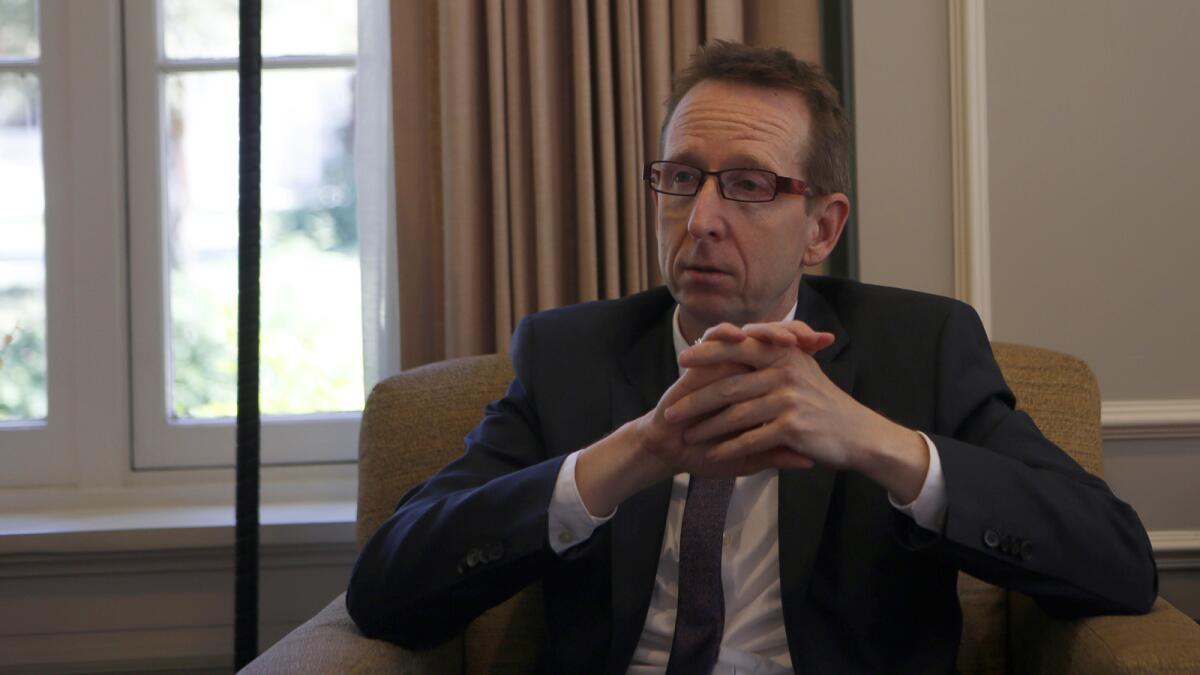USC pledges new steps to increase diversity, multicultural understanding

USC Provost Michael Quick wrote: “Equality is not a given; every generation must recommit to awareness and action.”
Amid national student protests over racial bias, USC announced Monday that it would direct new funds, launch discussion forums and appoint several key staff members to spearhead efforts to increase campus understanding of multiculturalism.
“Universities should be spaces committed to showing the promise of diversity and helping everyone recognize, appreciate and respect difference,” Michael W. Quick, provost and senior vice president for academic affairs, wrote in a letter to the USC community.
Quick said the new commitments reflect the university’s longstanding desire to enrich learning with a broad range of perspectives, support social justice and increase the potential for economic and cultural prosperity in today’s globalized world. But he said efforts to achieve those goals must be continually renewed.
“Equality is not a given; every generation must recommit to awareness and action,” he wrote.
Quick called the new efforts “initial steps” and asked the campus community to offer other “bold, novel ideas.”
Those steps did not include several demands made by undergraduate and graduate student leaders, who recently passed resolutions calling for a campus-wide action plan to address issues of bias and discrimination. Their longstanding complaints that USC has lagged behind more active efforts at UCLA, Brown and other universities received national attention in September after Rini Sampath, undergraduate student body president, wrote on Facebook about an incident in which a fraternity member threw a drink at her and hurled a racial epithet at her.
But Sampath hailed the efforts -- and Quick’s leadership -- as important advances.
“It’s a day of progress for us,” she said. “This is the kind of leadership we need from senior administrators. It signals they are willing to listen to us and embrace student activism. These are definite signs of an optimistic future for our campus.”
Students have asked the university to hire a vice president of diversity, equity and inclusion and vice deans for such matters in each academic division.
Other demands included a plan to measure and increase diversity of students, faculty, staff and trustees; a $100-million fund by 2025 for scholarships, fellowships, programming and mentorships for underrepresented groups; mandatory diversity training for faculty and students; increased funding and space for cultural centers serving African Americans, Asians, Latinos, LGBT students and others and an annual independent survey to gauge the campus climate toward diversity, equity and inclusion.
Quick said his office would establish a diversity task force to gather ideas on how to improve the campus climate, led by Varun Soni, dean of religious life, and Ainsley Carry, vice president for student affairs. Membership will include students, staff and faculty.
The office will also hold open forums to solicit views on the issue, along with a symposium series featuring community leaders and others who have long worked on diversity issues. Prof. Cecil “Chip” Murray, former pastor of the First African Methodist Episcopal Church of Los Angeles, will serve as special advisor.
Other steps include:
--All school deans will be asked to identify diversity liaisons and provide goals and actions they will take on the issue. Three faculty members and associate provosts--Daniela Bleichmar, Camille Rich and Larissa Rodriguez--will lead the provost’s office’s oversight and coordination of campus-wide diversity and inclusion efforts.
--Two new funds of $100,000 each will be established to support campus programming to enhance understanding of the issues. The funds will be administered by student government organizations and the religious life office.
--USC Visions and Voices, an arts and humanities program, will direct at least $100,000 of the programming budget to address diversity issues.
--The provost will solicit faculty research proposals and provide funds to enhance courses that probe issues of diversity, inclusion and access.
Quick said USC’s efforts in the area also include ongoing programs that fund scholarships, fellowships, faculty recruitment and neighborhood support. All told, he said the efforts will amount to more than $90 million a year over the next five years.
He also noted that USC had more student religious groups than any university in the nation, a large international student population and relatively high numbers of first-generation and low-income college students.
But he said the campus would strive to do more.
“Of course, we will not agree on every course of action; these issues are large, they are complex, and there are no perfect solutions,” Quick said in the letter. “In the end, the greatest form of diversity we have is diversity of opinion -- which we need to celebrate, not castigate. We must be prepared not only to support those with whom we agree, but also respect those with whom we disagree. “
For more education news, follow me @TeresaWatanabe
ALSO
As huge El Niño brews, California fights to keep drought mentality
Oakland police fatally shoot man who allegedly pointed replica gun
Man killed when struck in the face by homemade rocket at Scouting event
More to Read
Sign up for Essential California
The most important California stories and recommendations in your inbox every morning.
You may occasionally receive promotional content from the Los Angeles Times.











